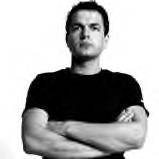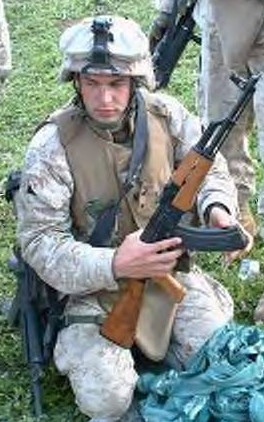 |
Antonio Agnone
Just
Another Brave Marine
by
Denny Meyer |
There is something about
marines that makes
them WANT to be marines; and it has nothing to
do with being gay or straight, it has everything
to do with wanting to be among the elite best.
Every marine that I have spoken to, both
enlisted and officer, had that same mentality,
the same esprit even before they became marines,
that drove them to join that toughest of
services. Well and good, there's a place
in life for everyone, they just have to find it
and dare to go for it. But, what of gay
people who join the Marines or any service for
that matter? ADF CPO O'Brien put it this
way: "What of straight people? There's no
difference at all." As
SSGT Eric Alva, Col.
Hank Thomas,
and Lt. Agnone have demonstrated, these guys are
no false stereotype of frail weak
character. On the contrary, to dare to
join the Marines is in itself an ultimate self
confidence and those gay people who joined are
no different at all. One is tempted to say
that they are braver yet, but they all deny
that; they are just like any other marine, they
say.
They served courageously in battle in accordance
with the MC credo, its expected of them, and
they did not disappoint. None could have
made it through the rigorous training even to reach
battle unprepared to go all the way. The
extra courage comes, perhaps, later, when they
each have had the integrity to bravely come out.
In war battle, being gay makes no
difference. As a married straight WWII vet of the
Normandy Invasion told me, "There were five
gay guys in our unit on the beach that
day. And I want you to know, the German bullets did not
discriminate. We all took care of each
other."
First
Lieutenant Antonio Agnone, United States Marine,
served nearly four and a half years before
deciding to leave his beloved service in order
to live freely as a gay man. He'd been
willing to sacrifice his life for freedom, but
not to sacrifice living freely.
His
grandfather had been a corporal in the U.S.
Marines during World War II who had fought, as a
mortar man in the battles for Okinawa and Palau.
Growing up in Columbus, Ohio, the oldest of
seven children, Antonio Agnone had been reared to
believe that you serve the country that provides
for you. He wanted to serve with the best,
as an officer. While in college, he
contracted with the Marines and was in the OCS
program from his Junior to Senior years and then
went into active service. He graduated at the top of his class from
the Marine Corps Engineer School.
He earned The
Navy Marine Corps Commendation Medal, A Navy
Marine Corps Achievement Medal, The Global War
on Terrorism Service Medal, An Iraqi Campaign
Medal, A Sea service Deployment Ribbon, and NDSM.
Under the
Don't Ask Don't Tell policy, when he signed up,
he had to sign a statement that he did "not
possess the propensity to commit a
homosexual act." Although he was
uncomfortable with that, he did not really
realize his inner identity until much later
during his service. The flaw of the
policy, he said, is that it forces a lapse of integrity,
it asks people to lie at least by omission,
which contradicts the Marine Corps ideal.
More than
anything else, he wanted to deploy and focused
on that. He had a platoon depending on him
to be fully trained and ready to deploy
together. And so, when he met his partner,
he came out to his parents so that they would be
there for him should something happen to him
during his deployment. Within his family,
this was accepted as the right and responsible
thing to do. For himself, Antonio Agnone
had provided peace of mind so that he could do
his job leading marines in a combat zone.
His sacrifice was isolation, keeping a distance
from fellow officers and friends. Still he
took the risk of sending and receiving letters
(his unit was too distantly deployed to have
access to e-mail). He realized that his
fellow marines who handled the mail would see
the regular letters from someone named
Brandon. It was not an issue for anyone;
he and his troops were concerned only with
keeping one other alive, he said. With
the constant combat stress of the potential for
sudden injury or death; it is the letters from
spouses that help deployments be
successful. An unintended consequence of
DADT is the added isolation or risk of such
letters for gay servicemembers.
 |
What kind of
United States Marine hero is Antonio Agnone?
Leading a platoon in the Marine Corpsí elite 22nd
Marine Expeditionary Unit, he
and his troops were doing an ordinance and
weapons sweep along the Euphrates River.
Metal detectors had revealed a hillside full of
enemy ordinance, RPGs, mortars, etc., all
covered in palm branches in an area where there
were no trees. Each item had to be
carefully moved and blasted. At one point,
one of his troops asked him to come and have a
look at an IED that was live and ready to
be moved up the hill by insurgents to be
emplaced in the road to explode American
military vehicles. Lt. Agnone had no way
of knowing its triggering mechanism or whether
a
timer had already been set. His immediate
concern was for the safety of his troops if it
were to explode where it was and set of
secondary explosions from the other nearby enemy
ordinance. "So, I picked it up and
moved it 200 meters away, as it was
quickest way to make my marines safe. There was no time to
decide to bring in the robots," he told
me. It is somewhat unusual for a Marine
Corps lieutenant to be awarded a Marine Corps
Commendation Medal, but that act of selfless
courage was one of the reasons he did. Antonio
Agnone said he was simply taking care of his
marines and "getting the job
done." When you think about such
steel trap bravery, those words, that we often
think of as mere talk, become very clear and
meaningful. |
| He was doing
what marines are
expected and trained to do. He was
committed to making sure all his guys got home
safely. This fellow is not Rambo; he's
just another Marine. Does his being gay
have any relevance in any of this? It was
relevant only in that he had to himself arrange
for his partner being supported, had that IED
killed him. America's armed forces take
care of heterosexuals' families; but not gay
families, which must remain hidden due to the
pointless policy. Courage, on the other
hand, doesn't ask who is gay or straight. |
And yet,
unlike others, he could never let his guard down
to be able to vent and talk about family to
release the stress of combat. It made
things unnecessarily more difficult and could
have affected his ability to react and see to
the well being of his troops. Clearly it
did not, but it did result in a far longer
decompression after he returned home.
Asked whether there
were any incidents where he might have been
suspected of being gay, he told me that it never
became an issue; however, he said, some fellow
Marines wondered about the club music he had in
his ipod! No one ever said anything, but
there were 'looks.' Oh my, I suppose his
fellow marines didn't mind if he listened to
Anastasia while carrying a bomb away from them!
Ultimately, he
decided with his partner that he would not stay
on for yet another tour of deployment under the
same conditions in which he had to carry the
burden of secrecy and his partner was excluded
from the family benefits that his heterosexual colleagues
took for granted.
Today, Antonio
Agnone is dedicated to speaking out for those
still serving who cannot speak up about the
discriminatory DADT policy. He is the
point man for Human Rights Campaign's efforts to
have the policy repealed. His Legacy of
Service campaign will visit cities across
America, presenting the stories of those who
have served courageously. To find out more
about that tour, please visit the HRC Legacy of
Service website: http://www.hrc.org/legacyofservice/
|